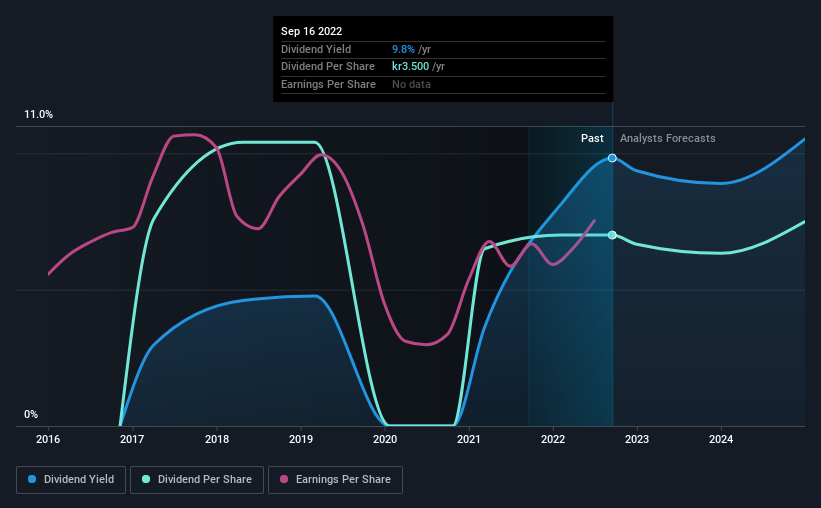- Sweden
- /
- Consumer Durables
- /
- OM:BONAV B
Bonava (STO:BONAV B) Is Paying Out A Larger Dividend Than Last Year
Bonava AB (publ)'s (STO:BONAV B) dividend will be increasing from last year's payment of the same period to SEK1.75 on 6th of October. This will take the annual payment to 9.8% of the stock price, which is above what most companies in the industry pay.
View our latest analysis for Bonava
Bonava's Earnings Easily Cover The Distributions
A big dividend yield for a few years doesn't mean much if it can't be sustained. Bonava is quite easily earning enough to cover the dividend, however it is being let down by weak cash flows. In general, we consider cash flow to be more important than earnings, so we would be cautious about relying on the sustainability of this dividend.
Over the next year, EPS is forecast to fall by 24.3%. If the dividend continues along recent trends, we estimate the payout ratio could be 48%, which we consider to be quite comfortable, with most of the company's earnings left over to grow the business in the future.

Bonava's Dividend Has Lacked Consistency
It's comforting to see that Bonava has been paying a dividend for a number of years now, however it has been cut at least once in that time. Due to this, we are a little bit cautious about the dividend consistency over a full economic cycle. Since 2017, the annual payment back then was SEK3.80, compared to the most recent full-year payment of SEK3.50. The dividend has shrunk at around 1.6% a year during that period. Generally, we don't like to see a dividend that has been declining over time as this can degrade shareholders' returns and indicate that the company may be running into problems.
Dividend Growth Is Doubtful
Given that the dividend has been cut in the past, we need to check if earnings are growing and if that might lead to stronger dividends in the future. Over the past five years, it looks as though Bonava's EPS has declined at around 6.6% a year. A modest decline in earnings isn't great, and it makes it quite unlikely that the dividend will grow in the future unless that trend can be reversed.
Bonava's Dividend Doesn't Look Sustainable
In summary, while it's always good to see the dividend being raised, we don't think Bonava's payments are rock solid. While Bonava is earning enough to cover the payments, the cash flows are lacking. Overall, we don't think this company has the makings of a good income stock.
It's important to note that companies having a consistent dividend policy will generate greater investor confidence than those having an erratic one. Still, investors need to consider a host of other factors, apart from dividend payments, when analysing a company. Case in point: We've spotted 3 warning signs for Bonava (of which 2 can't be ignored!) you should know about. Is Bonava not quite the opportunity you were looking for? Why not check out our selection of top dividend stocks.
Valuation is complex, but we're here to simplify it.
Discover if Bonava might be undervalued or overvalued with our detailed analysis, featuring fair value estimates, potential risks, dividends, insider trades, and its financial condition.
Access Free AnalysisHave feedback on this article? Concerned about the content? Get in touch with us directly. Alternatively, email editorial-team (at) simplywallst.com.
This article by Simply Wall St is general in nature. We provide commentary based on historical data and analyst forecasts only using an unbiased methodology and our articles are not intended to be financial advice. It does not constitute a recommendation to buy or sell any stock, and does not take account of your objectives, or your financial situation. We aim to bring you long-term focused analysis driven by fundamental data. Note that our analysis may not factor in the latest price-sensitive company announcements or qualitative material. Simply Wall St has no position in any stocks mentioned.
About OM:BONAV B
Bonava
Operates as a residential developer in Germany, Sweden, Finland, Norway, Estonia, Latvia, and Lithuania.
Reasonable growth potential and fair value.
Similar Companies
Market Insights
Community Narratives




